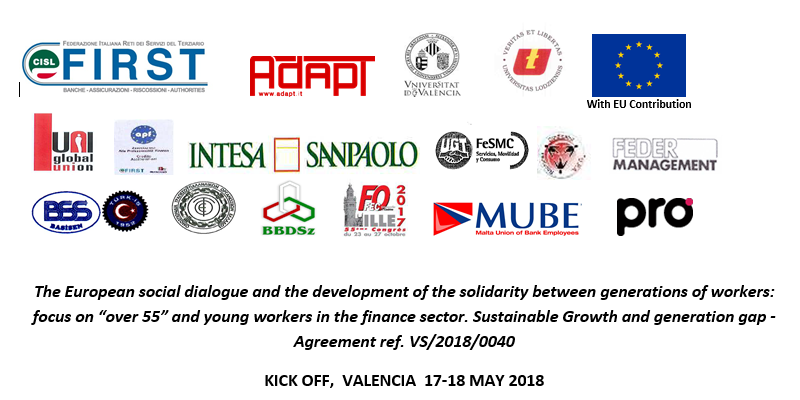Ageing of the working population, valorisation and protection of ‘aged’ workers: these are the topics that will be discussed in Valencia in the next few days at the kick-off meeting of the project presented by First Cisl and financed by the European Commission “The European social dialogue and the development of the solidarity between generations of workers: focus on “over 55″ and young workers in the finance sector. Sustainable Growth and Generation Gap” (VS/2018/0040)
The increase in average life expectancy and the related ageing of the population, combined with the decline in the birth rate, have led to major demographic changes in Europe, exacerbating the anomalies in the pyramid age. It is estimated that in 2060 29.5% of the total population will be “over 65” (in 2013 this percentage was 18.2, according to Eurostat).
The impact on pension systems has been negative from a financial point of view and will worst in the future, leading to an imbalance in the social security accounts of the various Member States of the Union and more generally on social protection systems. The response has been a progressive increase in the retirement age, which has led to significant changes in the age structure of the working population in many companies, both at a general level and in the productive sectors.
In the financial sector, during almost the same period, a strong process of mergers and incorporations started with the aim of strengthening the capital structure of the system, which, however, produced a considerable quantity of redundancies in terms of human resources in the sector as a negative effect. In these phases of company reorganization, processes of expulsion of labour were activated, which penalized above all the older workers, often belonging to the category of executives and workers with greater professionalism. The result was a net loss of knowledge and professionalism for companies, a intangible and unique asset, able to guarantee the continuity of success over time and the permanence of corporate identity values, through the transmission of experiences from one working generation to another.
Older workers in fact represent a wealth of knowledge and experience to be exploited and passed on to younger generations, certainly not a “ballast” to be unloaded.
First Cisl, for years aware of the importance of these issues, in 2011 developed a project, in partnership with 9 partners from 6 European countries, aimed at better understanding the phenomenon and promoting initiatives on the theme of intergenerational solidarity. The project was funded by the EC, the objectives and results were appreciated and included in the report produced by the EC on initiatives related to the European Year of Active Ageing, 2012, available here.
“Six years later, the demographic and socio-economic context of reference has not changed – says Sara Barberotti, National Secretary and Project Manager of the project -. Since then, the aging of the European population and the retirement age has increased with the increase in life expectancy and older workers have been considered more a problem rather than an opportunity for companies in general and in particular for the professional growth of younger workers. In addition to these phenomena, the process of digitizing activities has accelerated in the financial sector, with a strong increase in new technologies in production processes, which tends to create a sort of new ‘return illiteracy’ in the older classes of workers, accentuating the obsolescence of old knowledge”.
“With these premises – continues Barberotti – we have submitted with a positive outcome this European project to the European Commission. It joins 10 European countries, 9 trade unions, two prestigious universities (Valencia and Lodtz) and an important research centre (Adapt), Uni-Europe, Federmanagement and the Intesa Sanpaolo Group, with the aim of demonstrating that the most effective response to the challenges of demographic change is the correct management of the ageing of the working population through policies of intergenerational solidarity and flexicurity negotiated for “aged” workers which integrate public social security systems”.



